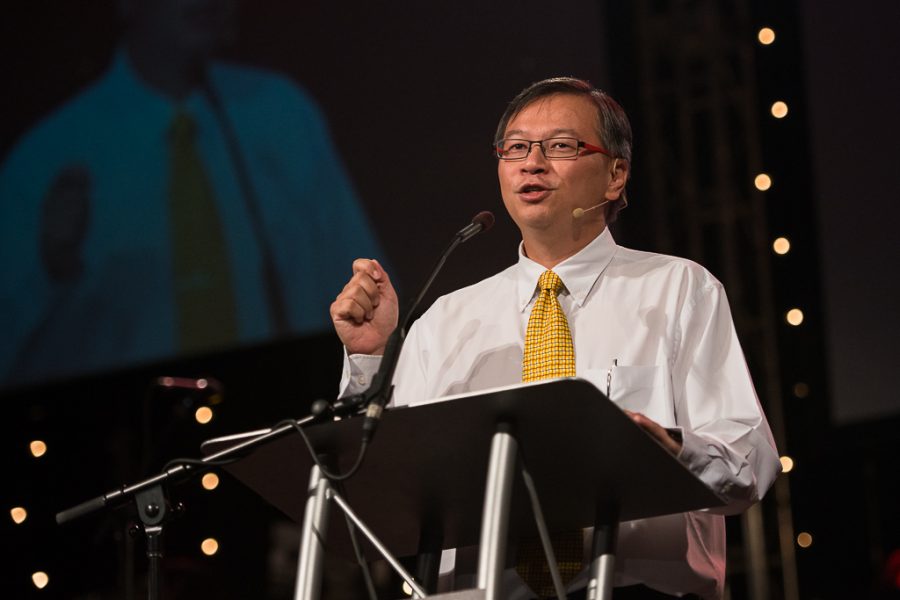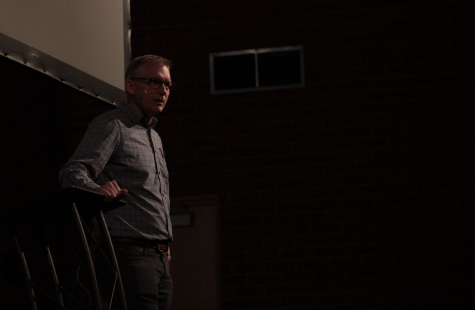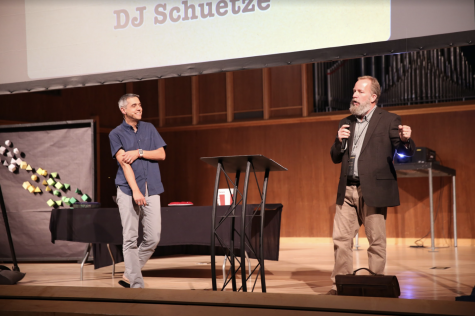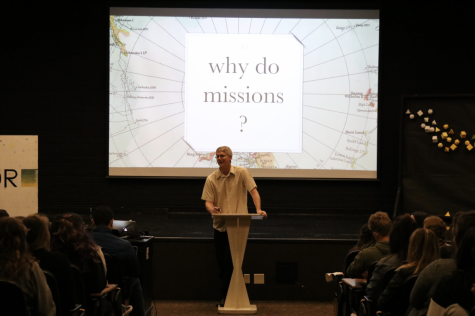Unearthing buried treasure: all vocations serve God
Anna Frost reflects on the opening session of the 84th Missions Conference with speaker Timothy Liu.
Timothy Liu speaks during the opening session of Missions Conference on Wednesday. Liu stressed the importance of living missionally in all areas of culture, particularly the marketplace. | Olivia Blinn/THE CHIMES
March 13, 2013
The first session of Missions Conference began by airing a dirty secret. A video, which made no reference to the All American Rejects song, addressed the general student opinion that Missions Conference is only for intercultural studies majors and other students who aim for the mission field by asking attendees to dispel that dirty secret completely. Before the parade of flags flooded the gym, the video ominously warned students that if they go into the conference with the mindset that it doesn’t apply to them, they might just miss God.
Timothy Liu, a salesman from Singapore and the first speaker of this year’s Missions Conference, confronted the same belief that many Christians hold about missions. In his speech, Liu addressed the flawed Christian view that there should be a separation between church and missions workers and those who hold secular jobs. With a hint of irony, he introduced students to “the Christian caste system,” a hierarchy which placed missionaries at the top, followed by pastors, social workers, doctors and teachers. At the bottom of this hierarchy sat tradespeople and, finally, those who work in the business spectrum. While this idea seems laughable when presented in such a classist manner, this is exactly the view I see in the church and at Biola. People talk about higher callings to the mission field, and then gently pat the hands of those entering the secular workforce and reassure them that they can be lights there too.
However, Liu was just as adamant as the opening video about abolishing the idea that one calling of work is more godly than another. Liu followed the hierarchy chart with a quote from Martin Luther, addressing this same issue and confirming it not to be a modern one. The key part discussed this mindset and condemned it.
“The idea that the service to God should have only to do with a church altar, singing, reading, sacrifice and the like is without doubt but the worst trick of the devil,” he said. “The whole world could abound with services to the Lord … not only in churches but also in the home, kitchen, workshop, field.”
Work becomes worship, Liu said. He clarified that he is not asking us to worship our daily work, but rather to worship God in and through our daily work by doing it well. Work was not meant to be a curse on mankind, but instead, it was to be a pleasure. Instead, sin has corrupted work, just as it has corrupted everything else, and humankind now exploits the created order that it was meant to serve and protect. The salvation he preached extends not just to people, but to all created order. Liu began the ubiquitous John 3:16 verse, “For God so loved the …,” but as students replied with “world,” he corrected them with the word “kosmos.” “Kosmos” refers to all created order, therefore salvation is a call to redeem all things, all parts of human life, all vocations. As Dorothy Sayers said, “the church has forgotten that the secular vocation is sacred.” Our job is do what God calls us to do well — no calling is above another.
As a journalism student in a Christian university, I have heard talk about ministry in the secular workplace and living in a missionally minded manner in my vocation. While my instructors made these points with good intentions, no one has spoken on the matter in such a biblically-grounded and compelling way. Liu spoke to every student in the auditorium, including me, who was wondering why they should pay attention at Missions Conference this year.






